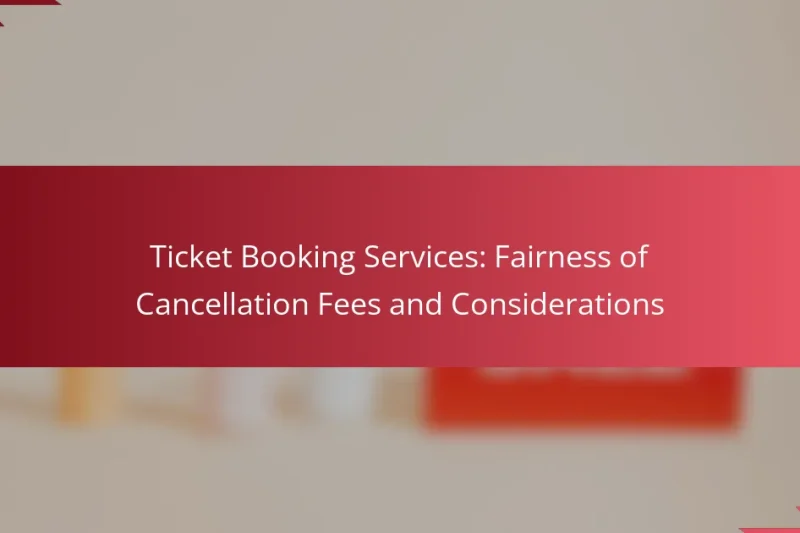Ticket booking services in the US provide a range of options, including online platforms, mobile apps, … Ticket Booking Services: Cancellation Policies, Types, and NavigationRead more
Cancellation and Refund Policies
Understanding cancellation and refund policies is crucial for managing your travel plans effectively. These policies can differ widely among providers and dictate the conditions for cancellations, potential fees, and eligibility for refunds. Familiarizing yourself with these guidelines, including specific procedures for requesting refunds, can help you navigate any changes to your itinerary with confidence.
Ticket Booking Services: Requesting Refunds Successfully and Strategies
Requesting a refund for ticket bookings can be a straightforward process if you understand the specific … Ticket Booking Services: Requesting Refunds Successfully and StrategiesRead more
Ticket Booking Services: Refund Timelines and Expectations
When booking tickets, it’s essential to understand the refund timelines and expectations, as they can vary … Ticket Booking Services: Refund Timelines and ExpectationsRead more
Flexible vs. Strict Cancellation Policies: Which Is Better and When to Use
Choosing between flexible and strict cancellation policies is crucial for businesses, as each approach has distinct … Flexible vs. Strict Cancellation Policies: Which Is Better and When to UseRead more
Ticket Booking Services: Protecting Against Non-Refundable Purchases
When booking tickets, it’s essential to be aware of the risks associated with non-refundable purchases. To … Ticket Booking Services: Protecting Against Non-Refundable PurchasesRead more
Ticket Booking Services: Fairness of Cancellation Fees and Considerations
When booking tickets, understanding cancellation fees is crucial for travelers looking to adjust their plans without … Ticket Booking Services: Fairness of Cancellation Fees and ConsiderationsRead more
Ticket Booking Services: COVID-19 Impact on Refund Policies
The COVID-19 pandemic has profoundly influenced ticket booking services, prompting many companies to revise their refund … Ticket Booking Services: COVID-19 Impact on Refund PoliciesRead more
What are common cancellation policies in the travel industry?
Common cancellation policies in the travel industry vary by provider and can significantly impact your plans. Generally, these policies outline the conditions under which you can cancel a booking and whether you will receive a refund or incur fees.
Airline cancellation policies
Airline cancellation policies typically depend on the type of ticket purchased. Non-refundable tickets often come with strict rules, allowing changes or cancellations only for a fee, while refundable tickets may offer full refunds if canceled within a specified timeframe, usually 24 hours after booking.
It’s essential to check the specific airline’s policy before booking, as many airlines have different rules regarding cancellations due to unforeseen circumstances, such as illness or natural disasters. For instance, some airlines may waive fees for cancellations made within a certain period before the flight.
Hotel cancellation policies
Hotel cancellation policies can vary widely, with many hotels offering flexible options that allow cancellations up to 24-48 hours before check-in without penalty. However, some hotels may require a non-refundable deposit or charge a fee for late cancellations.
When booking, look for the cancellation policy details on the hotel’s website or booking platform. Consider whether the hotel offers a flexible rate that allows for free cancellation, especially during peak travel seasons when plans may change.
Travel agency cancellation policies
Travel agency cancellation policies often depend on the specific services booked, such as flights, hotels, or packages. Agencies may have their own terms that differ from those of the airlines or hotels, including cancellation fees or restrictions based on the supplier’s policies.
Before finalizing a booking through a travel agency, inquire about their cancellation terms. Some agencies may offer travel insurance options that can help mitigate losses in case of cancellations, providing an added layer of protection for your investment.
How to request a refund for a canceled flight?
To request a refund for a canceled flight, you typically need to contact the airline directly or use their online refund forms. Each airline has its own procedures, so it’s essential to follow the specific guidelines provided by your carrier.
Contacting the airline directly
Reaching out to the airline directly is often the most straightforward method for requesting a refund. You can do this via phone or through their customer service chat. Be prepared to provide your booking reference and any relevant details about your flight.
When contacting customer service, ask about their specific refund policies, as they can vary widely. Some airlines may offer immediate refunds, while others might take several days to process your request.
Using online refund forms
Many airlines provide online refund forms on their websites, which can streamline the refund process. Look for a section dedicated to refunds or cancellations, and fill out the required information accurately.
Before submitting the form, double-check your details to avoid delays. Some airlines may require additional documentation, such as proof of cancellation or identification, so have those ready if needed.
What are the legal rights for refunds in the UK?
In the UK, consumers have specific legal rights for refunds, primarily governed by the Consumer Rights Act 2015 and the Distance Selling Regulations. These laws ensure that consumers can receive refunds under certain conditions, such as when goods are faulty or services are not delivered as promised.
Consumer Rights Act 2015
The Consumer Rights Act 2015 provides consumers with the right to a refund if goods are faulty, not as described, or unfit for purpose. If a product is defective, consumers can request a full refund within 30 days of purchase. After this period, the retailer may offer a repair or replacement instead.
It is essential to keep proof of purchase, such as receipts, as this documentation supports your claim for a refund. Retailers are obligated to process refunds promptly, typically within 14 days of receiving the returned item.
Distance Selling Regulations
The Distance Selling Regulations apply to purchases made online, over the phone, or through mail order. Under these regulations, consumers have the right to cancel their order within 14 days of receiving the goods, known as the “cooling-off period.” During this time, consumers can return items for a full refund, including standard delivery charges.
To exercise this right, consumers must inform the seller of their decision to cancel, usually in writing or via email. It’s advisable to keep records of this communication. After cancellation, consumers should return the goods within 14 days to receive their refund, although they may be responsible for return shipping costs unless stated otherwise by the seller.
How do cancellation policies differ by region?
Cancellation policies vary significantly by region, influenced by local laws, cultural practices, and industry standards. Understanding these differences is crucial for consumers and businesses alike to navigate potential fees and refund processes effectively.
North American policies
In North America, cancellation policies are often flexible, particularly in the travel and hospitality sectors. Many airlines and hotels allow cancellations up to 24 hours before the scheduled service without penalty, while others may charge a fee or offer partial refunds.
Consumers should be aware that policies can vary widely between companies. For example, budget airlines may have stricter cancellation terms compared to full-service carriers. Always check the specific terms at the time of booking to avoid unexpected charges.
European policies
European cancellation policies tend to be more consumer-friendly, often governed by regulations that protect travelers. For instance, under EU law, passengers are entitled to refunds for canceled flights, and many accommodations offer a 14-day cooling-off period for cancellations.
However, the specifics can differ by country and provider. It’s advisable to read the cancellation terms carefully, especially for non-refundable bookings, and to consider travel insurance for additional protection against unforeseen changes.
What factors influence cancellation fees?
Cancellation fees are primarily influenced by the timing of the cancellation and the type of ticket purchased. Understanding these factors can help you minimize costs and make informed decisions when booking travel.
Timing of cancellation
The timing of your cancellation plays a crucial role in determining the fees you may incur. Generally, the closer you are to the departure date, the higher the cancellation fees will be. For instance, cancelling a flight several weeks in advance may result in a low fee or even a full refund, while cancelling within 24 hours of departure could lead to significant charges.
Many airlines and travel companies have specific cut-off times for cancellations, often ranging from 24 hours to a few days before the scheduled departure. It’s advisable to check the specific policy of your provider to avoid unexpected costs.
Type of ticket purchased
The type of ticket you purchase significantly affects cancellation fees. Flexible tickets typically allow for easier cancellations with lower fees, while non-refundable or basic economy tickets often come with strict cancellation policies and higher penalties.
For example, a flexible ticket might allow you to cancel up to an hour before departure for a small fee, whereas a non-refundable ticket could result in losing the entire fare. Always review the terms associated with your ticket type to understand your options and potential costs.
How to compare cancellation policies across companies?
To effectively compare cancellation policies across companies, focus on key aspects such as flexibility, fees, and deadlines. Understanding these elements will help you make informed decisions when booking services.
Using comparison websites
Comparison websites can streamline the process of evaluating cancellation policies by aggregating information from multiple companies. Look for platforms that allow you to filter results based on cancellation terms, fees, and customer ratings.
When using these sites, ensure they are reputable and updated regularly. Some popular options include Kayak for travel bookings and Trustpilot for service reviews, which can provide insights into cancellation experiences.
Reading customer reviews
Customer reviews offer real-world insights into how cancellation policies are implemented by companies. Pay attention to comments regarding the ease of obtaining refunds and the responsiveness of customer service during cancellation requests.
Look for patterns in reviews, such as frequent complaints about hidden fees or delays in processing refunds. This information can help you gauge the reliability of a company’s cancellation policy before making a commitment.
What are emerging trends in cancellation policies?
Emerging trends in cancellation policies reflect a growing emphasis on flexibility and customer-centric approaches. Many companies are adopting more lenient terms, allowing customers to cancel or modify bookings with minimal penalties, often influenced by market competition and consumer demand for convenience.
Increased Flexibility
Many businesses are now offering increased flexibility in their cancellation policies, allowing customers to change or cancel reservations without heavy penalties. This trend is particularly evident in the travel and hospitality sectors, where companies recognize that customer satisfaction can lead to repeat business.
For example, airlines may allow free cancellations or changes within a certain timeframe, often up to 24 hours before departure. This flexibility can enhance customer loyalty, as travelers appreciate the ability to adjust plans without incurring significant costs.
Transparent Communication
Clear and transparent communication regarding cancellation policies is becoming a priority for many businesses. Companies are now providing detailed information about their terms upfront, which helps customers make informed decisions and reduces confusion.
For instance, online platforms often display cancellation policies prominently during the booking process, ensuring that customers understand any potential fees or restrictions. This approach not only builds trust but also minimizes disputes over cancellations.
Technology Integration
Technology is playing a crucial role in shaping modern cancellation policies. Many businesses are leveraging digital tools to streamline the cancellation process, making it easier for customers to manage their bookings online.
For example, mobile apps and websites often feature user-friendly interfaces that allow customers to cancel or modify their reservations with just a few clicks. This integration of technology not only enhances the customer experience but also reduces administrative burdens for companies.






